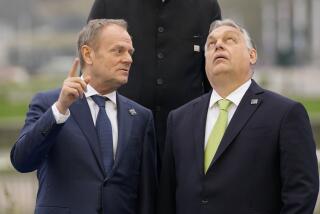Baker Stresses East Bloc Economic Ties to West
- Share via
VIENNA — Secretary of State James A. Baker III, signaling that the Bush Administration plans an active role in encouraging political reform in the Communist states of Eastern Europe, told the foreign ministers of Poland and Hungary on Sunday that the United States will try to help move their economies toward the West, aides said.
Baker met with the two foreign ministers, whose countries have embarked on the Soviet Bloc’s most audacious reform programs, after arriving in the Austrian capital for the opening of European disarmament talks today. Baker is scheduled to meet with Soviet Foreign Minister Eduard A. Shevardnadze here Tuesday.
‘Very Impressive Meetings’
“These were very impressive meetings,” a U.S. official said after the talks with Poland’s Tadeusz Olechowski and Hungary’s Peter Varkonyi. “Both foreign ministers described their own situations as a historic turning point--but both also recognized the tensions inherent in their reforms.”
The tensions, he noted, result from the Soviet Union’s continued military control of Eastern Europe and uncertainty, in Washington as well as Warsaw and Budapest, over how much reform Soviet President Mikhail S. Gorbachev is likely to tolerate.
Poland’s Communist regime is engaged in high-level negotiations with the outlawed Solidarity trade union aimed at legalizing the opposition labor group within a new national political structure. Hungary has liberalized its economy more than any other Soviet Bloc state and has announced that independent political groups may run candidates in parliamentary elections in 1990.
Both Olechowski and Varkonyi described their political reforms as “aiming toward a multi-party system,” a Baker aide said.
“There was clearly an invitation for the United States and the new U.S. leaders to play an additional role,” he said.
Baker replied that the Bush Administration is willing to help, especially in creating new economic links between the Eastern European countries and the West, aides said.
Backing for ‘New Thinking’
“The United States has an opportunity here to put some content into the slogans of ‘new thinking,’ ” said one, referring to Gorbachev’s reform program.
Gorbachev told Hungarian Premier Karoly Grosz in Moscow last week that each Eastern European regime is free to “work out its policies in a sovereign fashion,” according to official Soviet reports. If Gorbachev continues to allow the satellite nations free reign, it could mean the effective end of the Brezhnev Doctrine, named after the late Soviet leader Leonid I. Brezhnev, under which Moscow claimed the right to use force to prevent defections from the Soviet model of communism.
Baker, too, had words of praise for Hungary’s reform program. “It certainly seems to be going pretty well,” he told reporters as he met with Varkonyi at his hotel here.
Still, Hungarians, Poles and Americans all expressed caution about the chances of actually creating a democratic, multi-party system under Communist rule.
“Both (Varkonyi and Olechowski) spoke of seeking change . . . while avoiding anarchy,” said one Baker aide.
“There are obviously Soviet sensitivities involved in this process,” said another.
Delicate Balance
They indicated that the Bush Administration plans to include the issue of Eastern Europe in its talks with the Soviet Union--but without interfering directly in the delicate balance between the Communist reformers and Moscow.
Instead, they said, the Administration will concentrate on specific ways to help nudge the economies of Hungary and Poland toward the West, in part “to create changes that will be harder to reverse,” said one.
In the talks on Sunday, Poland’s Olechowski asked for U.S. assistance with his government’s efforts to gain help with its foreign debt through the International Monetary Fund and said Poland is eager to encourage new investment from the West, U.S. officials said. They did not reveal Baker’s response.
In the talks with Hungary’s Varkonyi, Baker raised the issue of extending most-favored-nation trade status for Budapest. Hungary already has that status, which allows it to export products to the United States at low tariff rates, but the Administration wants to extend the provision beyond the current one-year term.
The future of Eastern Europe is also a central question underlying the Negotiations on Conventional Forces in Europe, which begin here today.
Cut in Forces Sought
The negotiations, which include the 16 members of the North Atlantic Treaty Organization and the seven members of the Warsaw Pact, are charged with reducing the size of the non-nuclear armed forces which have faced each other across Europe’s Iron Curtain since World War II.
Gorbachev has already started the process of arms cuts by announcing a unilateral withdrawal of 50,000 troops from Eastern Europe.
But the United States and other NATO countries say the Soviet Bloc still has far more troops and tanks on the Continent than the Western alliance.
NATO was formed to defend against an invasion of Western Europe by those Soviet forces. But in fact, since 1948 the Warsaw Pact’s troops have seen action only against their own populations: quelling an uprising in Hungary in 1956 and halting reforms in Czechoslovakia in 1968.
More to Read
Sign up for Essential California
The most important California stories and recommendations in your inbox every morning.
You may occasionally receive promotional content from the Los Angeles Times.














